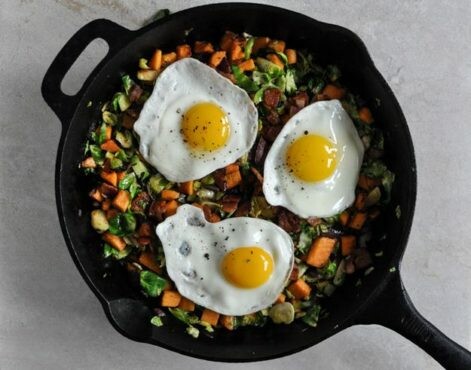
I get this question a lot when clients start a nutritional balancing program…what am I going to eat for breakfast? When I tell them that I think the best breakfast is protein and VEGGIES, the typical reaction is “You want me to eat WHAT for breakfast?”
We grew up with the belief that a good breakfast should contain large amounts of wheat, fruit, flavored yogurt, cereal, and now smoothies and protein bars. Some people prefer just to grab a cup of coffee and maybe a muffin or piece of toast. These foods typically associated with breakfast tend to be fairly quick to prepare but don’t contain much nutritional value to keep your body fueled throughout the day. But, the only thing that makes breakfast different from lunch or dinner on this plan is that it is generally a meal that needs to be prepared more quickly than usual.
Breakfast – The Most Important Meal Of The Day
Eating a good, nutrient dense breakfast is an important start to your day, but I know this is hard for those who are not hungry in the morning. One reason you may feel like skipping breakfast is because your body is still digesting food from the night before.
If you eat a large meal at dinner or are in a hurry and don’t chew your food well, it makes it much harder to digest. Lack of hunger in the morning can indicate a low stomach acid level, a zinc deficiency or a need for pancreatic enzymes. Targeted supplements can improve these levels, and so can eating a lighter, more relaxed meal the night before.
If you don’t like eating breakfast, start increasing the quality and quantity of your morning meal gradually, and you might find that your morning hunger improves. Skipping the morning meal can throw off your body’s rhythm of fasting and eating. When you wake up, the blood sugar your body needs to make your muscles and brain work their best is usually low. Breakfast helps replenish it. If your body doesn’t get that fuel from food, you may feel zapped of energy – and you’ll be more likely to overeat later in the day.
Beginning your day with a good source of protein and vegetables is a great way to start the day off right. This will help keep your blood sugar stable and keep you satiated for the morning, resulting in lower chances of snacking or eating undesirable foods. Adding in some high-quality fats (butter, ghee or meat fats) will also help keep you feeling full longer.
Another reason many people skip the morning meal is because they’re rushing to get out the door. Without food in your system before lunchtime, not only is your blood sugar unstable, your body can literally go into a fight-or-flight reaction due to hunger. This places significant stress on your body, in addition to other forms of stress you may already be dealing with. Regular, quiet, sit down meals, and eating slowly, chewing thoroughly and resting for at least 10-20 minutes after the meal is soothing for the digestive system and the body as a whole. So that means that eating in the car while you drive is not a good idea!
I’ve also had people ask if they can just drink juice instead of eating breakfast. When on a Balanced Healthy Program, it's recommended to consume fresh carrot juice daily, if tolerated. But if you do this, start slow and drink no more than 4-8 ounces per day (about 1 cup). Carrot juice adds valuable minerals to the diet, especially a bio-available form of calcium. Wheat grass is also acceptable, about 2 ounces, if one prefers that over carrot juice. Other types of juices are not recommended as they are too yin in nature and may interfere with digestion and blood sugar control.
However, juice should not be consumed with meals nor is it a substitution for breakfast. It is better to drink it 15-20 minutes before a meal to give the juice time to be absorbed easily. Some do well drinking carrot juice in the morning but others find that it upsets their blood sugar.
Breakfast Is The Toughest Meal To Reinvent
Your body needs easy-to-digest foods that are rich in minerals and vitamins to help replenish those that are out of balance in your body. A balanced healthy living plan focuses on cooked vegetables, bone broth and high-quality proteins. Your daily food intake should be 70-80% cooked (but not overcooked) vegetables. This is not a problem for most people when planning for lunch or dinner, but it can be really hard to think about when it comes to breakfast! Sound familiar? I hear it all the time… I just can’t do vegetables for breakfast! But in order to get in all the vegetables you need, it’s almost impossible unless you include veggies in your breakfast.
If you can eat eggs, a really good place to start is with eggs and steamed veggies. It’s best if the yolk is runny, as that’s where you’ll find the most vitamins. This combination will provide lots of good nutrients to give you energy for several hours.
But what if you don’t like eggs or can’t tolerate them? That’s the case for me, there’s something about the egg protein that doesn’t sit well with me. Eggs are a common food allergy with some people being more sensitive to the egg white, but tolerating the yolk just fine. So, if you can’t eat eggs, and you’ve eliminated wheat, nuts (toast, cereal, protein bars) and potatoes/hashbrowns and are sensitive to dairy (smoothies, yogurt) – what does that leave for breakfast?
So What Can I Eat For Breakfast?
When people think of breakfast, even a so-called “healthy” one, it’s hard not to conjure up images containing wheat and fruit. Because nutritional balancing does not lend itself well to traditional breakfast type foods, this is perhaps one of the most difficult concepts for people to get once they start the plan. My favorite breakfasts are those that combine foods I have prepared ahead of time, like meat patties or other protein, leftover vegetables or fresh cooked greens, along with a cup of bone broth.
One thing that makes it seem impossible to have vegetables for breakfast is the time factor. The foods that they are used to associating with breakfast tend to be relatively quick to prepare and most people think cooking vegetables takes too much time. The loss of convenience and pre-packaged foods can be the hardest in the morning when so many are in a rush to get out the door and go to work or whatever else is on their agenda for the day. For this reason, it’s even more ideal to have prepared meals or components on hand.
Planning ahead and having an idea of what you are going to cook during the next week will help you save time, no matter what meals you are preparing. I like to spend some time on Sunday planning ahead and doing my chopping and preparing as much as I can ahead of time. During the week, it is so nice to open the refrigerator and have veggies already chopped and ready to go.
I think that leftovers are really the quickest and easiest breakfast idea, and one of the most satisfying. I love leftovers! Learning to make enough lunch or dinner to have leftovers has been my best time saver in the mornings. A simple trip to our refrigerator can yield a gold mine of some kind of meat and then I just throw some vegetables into a skillet for a few minutes and have a complete, healthy breakfast.
Breakfast Ideas
You can easily piece together a nourishing and nutrient-dense meal in a matter of minutes with just a few ingredients.
- Leftover vegetables – If you have any leftover veggies from your dinner the day before you can throw them into the skillet to heat up with a meat patty (prepared ahead of time and frozen). You can also batch cook a big vegetable hash every week to quickly reheat for breakfast.
- Meat patties
- Three herb breakfast patties – Grass-fed ground beef, rosemary, thyme, sage, and sea salt. Herbs make everything better!
- Garlic-sage chicken patties – Ground pasture-raised chicken thigh meat, minced onion, sage, and minced garlic.
- Rosemary-mint lamb patties – Ground lamb, fresh mint, rosemary, and sea salt.
- Bone broth – Breakfast is a great time to enjoy a cup of broth! You can replace your morning coffee or tea, or you can add some leftover vegetables and meat to create a quick meal. If I could eat eggs, I would love 1 or 2 eggs in bone broth with veggies and sea salt. Yum!
- Sardines – If you run out of patties or are in a rush, a BPA-free can of sardines mashed up with some veggies can be a quick solution. I know this sounds crazy and maybe even a little gross to some people, but it’s super quick and easy!
- Leftover meals – Forget your prior conception of breakfast. If you have a leftover portion of stew or other hearty meal with a serving of protein, eat it for breakfast!
- If you can tolerate wheat free grains, a warm bowl of porridge consisting of rice, quinoa, millet, or amaranth with veggies and a healthy fat. These may not stabilize your blood sugar as much as protein will, but it can be a nice change once in a while.
- Breakfast skillet
- Start with a healthy fat (butter, ghee, or animal fat) and heat up a generous amount in your skillet: Pick a starchy vegetable such as sweet potatoes or yams and cook until just softened (around 15 minutes).
- Add some flavoring to the pan: Garlic, ginger, onion, shallots, rosemary, thyme, sage, or even a little cinnamon.
- Add one or two other vegetables to the pan and cook until almost completely soft: I like adding broccoli and/or spinach.
- Add one or two sunny side up eggs on top of the vegetable mix, or throw in some leftover meat.
If you are not a breakfast eater, please reconsider how you start your day. I hope you start setting yourself up for a successful ending with a nutritious beginning!
Disclaimer: The information contained herein is not to be construed as medical advice and is not intended to diagnose, treat, or cure any medical condition. These statements made have not been approved by the FDA, nor should they be taken as a substitute for medical advice from a licensed physician.
Affiliate Links: Some links on my website and emails are affiliate links. Should you click on these links and decide to purchase anything, I will receive a small commission and you will have my sincere thanks for supporting Tina’s Healthy Living.












